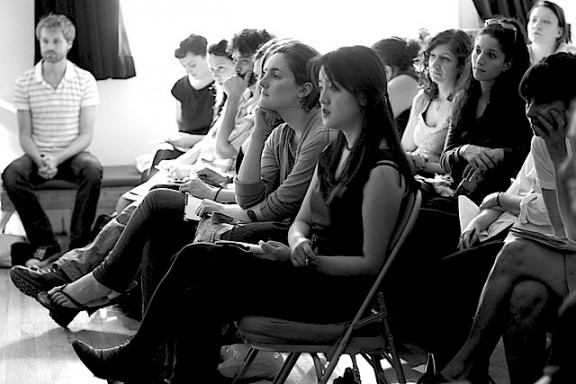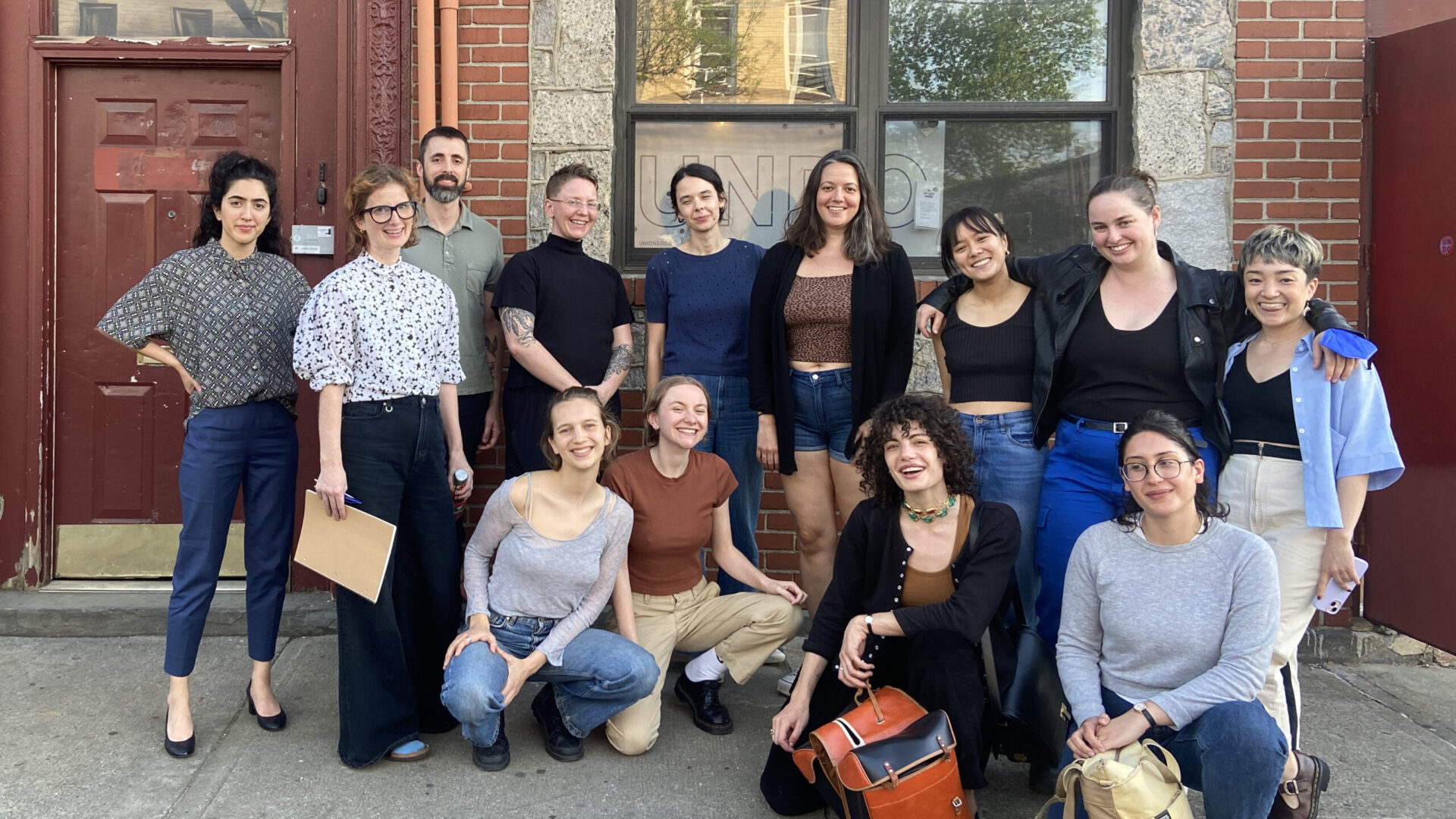
Steve: For the last part maybe we’ll open it up here to the audience if people have questions or comments for any of the panelists, or just thoughts in general about some of the stuff that was discussed.
Audience member: I was wondering about the strong space and separation between the writers on the one side and possibly filmmakers I guess on the other side. I did not raise my hand before because I never really considered myself being a writer. But what I’m really missing is some kind of encouragement for writers. I find writing really, really hard. Really. But what I also find really hard is to establish a way of writing that can contribute to the discourse of people who are cinephiles and really who are into that field because it’s a really tiny society.
Ed: I think that’s a good question because you know writers do—we talk about writing as if it’s one thing, but writers think about vastly different readership when they’re writing. On one level you get what I would think of as film reviewing—if you’re writing for a general publication you assume this kind of general reader. You’re writing one way, but if I’m writing I tend to write for our publications or for other publications that assume a much more narrow reader that has greater sophistication maybe in certain areas. I’m not saying in all areas, but in certain areas. So some different things have to be explained for the readership than others. So, that goes back to the fact that there’s criticism in the form of evaluation like, ‘You should see this or not.’ And then there’s criticism in the form of connoisseurship like, ‘This is the best and this is why.’ I think that Richard is more of a connoisseur than a reviewer per se, or at least you bring connoisseurship to your reviewing. And other reviewers might just simply be kind of like, I saw this movie and as someone who is kind of like you, general reader, and these are my thoughts on it. I think that depends on how you position yourself as a writer.
Richard: Depending on the subject—look at Film Forum which just showed a seven-hour long series about the history of the anti-apartheid movement in South Africa and worldwide.
Lisa: That’s true.
Ed Buy : Yeah, but it’s interesting to bring up because I was thinking as we were talking, none of us were talking about that kind of documentary at all. And that’s actually such a huge part of documentary, and it has such a huge life on television. We think about documentary as an art form, we tend to want to talk about the kind of observational documentary, but that kind of documentary has gotten even maybe less attention from writers.
Lisa: From critics.
Ed: From critics, yeah.
Richard: It means it’s less interesting, except that it’s—
Ed: Well, stylistically, there’s a formula that’s hewn to. I can only think of a few people like let’s say Thom Anderson, over the years, who’s taken the essay form and talk about history through the essay. But generally it’s like a strict form that we think of as like a history channel documentary.
??: And that narrows its appeal because of–?
Ed: No, it broadens its appeal numerically. Because it’s like a genre of television program. One can make a really good thing that actually does tell an interesting history. I think critics don’t write about it because A) it’s on television, not in theatres. And B) they’re always the same, formally. Like you said, you mentioned Ken Burns. There’s a kind of formula to making these things.
I think it’s to look at people who are normally thought of as essay filmmakers, like Chris Marker, or look at something like Resnais’ Night and Fog, there’s a whole history of talking about the past through these essay forms that’s not as restricted to the kind of Ken Burns legacy. Night and Fog was made about the Holocaust just about ten years afterwards.
Richard: But Shoah is not an historical documentary, Shoah is an existential documentary.
Ed: But he could make his documentary like Shoah. It could be the Shoah of Baseball or whatever.
[laughter]
One could do that. It might be amazing. It could be amazing. Who knows what would happen if you did that.
Audience member: My questions is, you started off the discussion asking people who were writers to raise their hands and filmmakers to raise their hands. I wanted to ask about people who are both. And from the critics on the panel I know there are at least a couple of people who are writing and making movies. and there’s a few people who are both. One the panel who are both writing and making movies. I’m thinking that because of the de-professionalization of writing, and the de-professionalization of documentary filmmaking, that’s gonna be more and more common. I wanted to see how you think that affects documentary criticism, and if it’s a good thing or a bad thing.
??: Who on the panel hasn’t made a movie? Of any kind?
Lisa: I was an actress, not a filmmaker.
Ed: I just want to put out two names of people who have done that really well. One I can think of obviously is Errol Morris. The other people don’t know about as much is Adam Curtis, who has a fantastic blog, that unfortunately in the US we can’t watch any of the clips on his blog, because they’re proprietary to the UK and they will block you from them. Which is amazing, I find it fascinating that people do that.
But Adam Curtis is someone who makes essay films, fantastic ones, and then his blogs are kind of like extensions of that form in the blog form, with clips and text.
Karin: I wanted to say I’m actually here sitting in for someone else. But my partner Kevin Lee is a film critic and a filmmaker. He became a film critic in his quest to become a filmmaker. He started watching the top one thousand films of all time. In doing so, he started making essays about the films, so they’re like these five minute essays that he did himself or partnered with other film critics. When I saw them, you know just as a friend, this is before we started the company, I thought, I mean, to me, I thought well this is a great direction that film criticism is moving in. They’re very personal essays, but they show clips, and they’re really interesting discussions of the films themselves. I felt that was a very nice amalgam to use the word of the day of his filmmaking and his film criticism. Right now he writes for our company, he edits the critics that we work with, and he’s in China making his own documentary. He also writers for The Auteurs and also there’s a new site that he’s working on. But he’s kind of found this lifestyle that, you know, I think that’s something maybe Ed was saying where criticism has diversified in a way where you can kind of pick and choose. And that kind of lifestyle that Kevin has right now maybe couldn’t have existed ten years ago.
Richard: It’s one of the hardest problems that filmmakers face. The writer can write every day. Most filmmakers have not found a way to shoot film every day. Of course, theoretically it’s possible, with a video camera the impediments are quite low. But, nonetheless, not too many people do it. So, the filmmaker has profusion of ideas, this tremendous runoff which finds no outlet. Especially, for me what’s strange about documentary, to get back to concerns about form and essay, is, you go out and film with a video camera, and you’re interviewing people and you’re shooting events that take place. But your mind is on overdrive. You’re full of ideas and reflections about what it is that you’re filming, what it is that you’re experiencing. To begin with, you essentially have two—just as the non-fiction writer has two books out of every book, or two articles out of every article. One of which is the article, and the other is the making of the confessions and then the reveries. So a filmmaker has the making of, the implicit making of built into the—
Thom: [There’s a] couple of things I wanted to say. There is an incredible amount of volunteerism writing about film going on in the blogs today. And one shortcoming of that, though, I feel, is a lot of the blog reporting is very reflexive, short burst of thought. I’m here at this film festival, this film was great, this film blew. And I hope that as we kind of settle into our internet age that some of, instead of that burst of thought, you suck, no, you suck kind of writing, that people can hoard up some of that time that they have, because they obviously have an enormous amount of time to donate to the internet and to this conversation, and just be a little bit more thoughtful. Instead of writing a blog post once a day, publish a piece of longer criticism once a month.
The last thing I wanted to say at this moment is when I, throughout this idea of documentary specialization I always get this kind of backlash, like, oh well, I don’t want to be a specialist, I want to write about everything. I think that’s good and fine, but there is specialty throughout all kinds of writing. Richard, I think of you as a specialist on Godard and the New Wave, and I’m always extra interested in what you have to say, because I know you’ve spend a lot more time thinking and researching this than almost anyone else I know. It doesn’t mean I’m not interested in what you have to say about other films too, but my antenna goes up a little extra. What I’d love to see is more people emerge with the kind of dedication to the documentary spectrum that you for instance have shown to the New Wave.
Richard: That’s an interesting question. I’m grateful for the positive, but I hope that it’s as interesting when I’m writing about The Blind Side or when I’m writing about a documentary. Maybe it’s not, god help me. But when Ed talks about stories–You know somebody asked me not long ago, ‘Do you write fiction?’
I said, ‘No, I write non-fiction. I live fiction.’
It was a joke, but it wasn’t a joke. Part of the reason why we’re attracted to stories is that stories are the way we think about our lives to ourselves. Stories are what we tell about ourselves, stories are what we think about ourselves, characters are what we see when we look in the mirror. As a result, the idea of—yes, there’s a journalistic side to documentary, but there’s also a psychological side to documentary just as with fiction, yes there’s a psychological side but there’s also a documentary side. A movie like I Now Pronounce You Chuck and Larry is a document of the first order about the state of homosexual relations around this time, or at least in New York around this time. If it weren’t it would have been a lot less interesting as a film. And so, I think that critics who are interested in documentary, ought also to be thinking about fiction in terms of living history, just as when they watch documentary to think about it in terms of psychology and personal relation to the material as to be thinking about the documentation of some particular issue journalistically.






This is a great document of a great discussion & I want to thank UnionDocs for sharing it.
Pingback: Underground Film Links: May 22, 2011 | Bad Lit